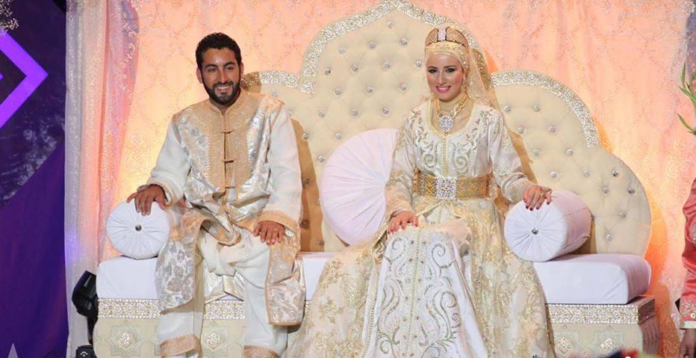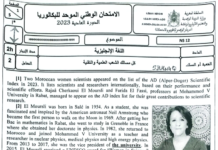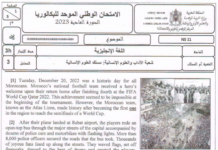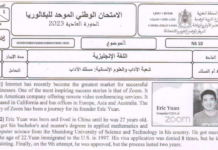The exam’s Comprehension Text
[1] Touria returned to Morocco together with her French spouse Michel and their one-year old child. She wanted to introduce her husband to her family and celebrate their marriage in the Moroccan way. She is just one of a growing number of Moroccan women deciding to marry men from other backgrounds and traditions.
[2] “Michel, now named Mehdi, is a friendly person. He tries to understand our traditions and social habits,” she said. Her husband agrees to raise their child in accordance with traditional Moroccan values while she respects his French roots. Although Touria’s mother accepted the marriage, she is worried about the success of the relationship because of cultural differences. According to her, marrying a foreigner would only cause problems, especially if there was lack of understanding.
[3] According to a recent study conducted by the Ministry of Justice, the number of Moroccan women who married foreigners increased from 2,507 in 2001 to 5,664 in 2009. Meanwhile, the number of Moroccan men who married foreigners rose from 1,366 in 2001 to 4,320 in 2009.
[4] Meriem, another Moroccan woman who is married to a Spanish man, said: “My marriage took place by chance. I went to a friend’s house on a weekend where I met Pedro. My father insisted on testing him for a month; so we invited him over to our house in Morocco. My father told him about the traditions of our society, family habits and the teachings of our religion. My husband accepted all that with an open heart.”
[5] Mustafa al-Ashhab, a lawyer, said: “Girls looking for opportunities to emigrate often choose to marry foreigners. Similarly, young men, looking for moral or financial support while living in a foreign country, get married to women in that country”. Yet, such mixed marriages often affect children’s identity and psychological stability.
[6] Jamal Al-Zayadi, a sociologist, believes that although spouses may have a good relationship with each other, children born to mixed marriages will still face problems. “They are foreigners when they come to Morocco, and they are Moroccans when they go to a foreign country despite the legal residence they have in that country,” Al-Zayadi explains. Consequently, they feel that they are marginalised, and this creates more problems for them and their parents. Fortunately, a new citizenship law has given mothers the right to pass their Moroccan citizenship on to their children of foreign husbands.
http://www.magharebia.com/
National exam | Humanities Stream | Ordinary Session 2011 with Answers





